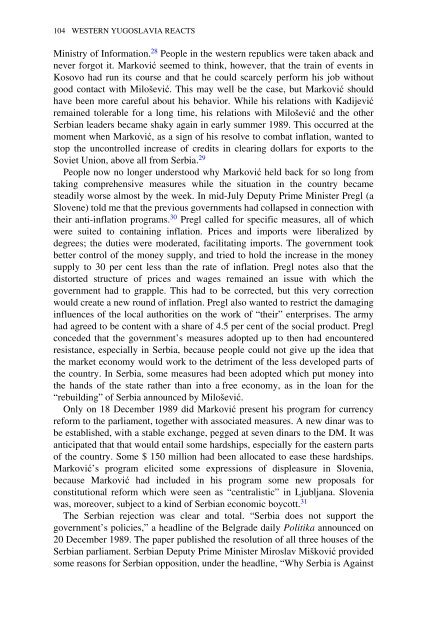Yugoslavia: A History of its Demise - Indymedia
Yugoslavia: A History of its Demise - Indymedia
Yugoslavia: A History of its Demise - Indymedia
Create successful ePaper yourself
Turn your PDF publications into a flip-book with our unique Google optimized e-Paper software.
104 WESTERN YUGOSLAVIA REACTS<br />
Ministry <strong>of</strong> Information. 28 People in the western republics were taken aback and<br />
never forgot it. Marković seemed to think, however, that the train <strong>of</strong> events in<br />
Kosovo had run <strong>its</strong> course and that he could scarcely perform his job without<br />
good contact with Milošević. This may well be the case, but Marković should<br />
have been more careful about his behavior. While his relations with Kadijević<br />
remained tolerable for a long time, his relations with Milošević and the other<br />
Serbian leaders became shaky again in early summer 1989. This occurred at the<br />
moment when Marković, as a sign <strong>of</strong> his resolve to combat inflation, wanted to<br />
stop the uncontrolled increase <strong>of</strong> cred<strong>its</strong> in clearing dollars for exports to the<br />
Soviet Union, above all from Serbia. 29<br />
People now no longer understood why Marković held back for so long from<br />
taking comprehensive measures while the situation in the country became<br />
steadily worse almost by the week. In mid-July Deputy Prime Minister Pregl (a<br />
Slovene) told me that the previous governments had collapsed in connection with<br />
their anti-inflation programs. 30 Pregl called for specific measures, all <strong>of</strong> which<br />
were suited to containing inflation. Prices and imports were liberalized by<br />
degrees; the duties were moderated, facilitating imports. The government took<br />
better control <strong>of</strong> the money supply, and tried to hold the increase in the money<br />
supply to 30 per cent less than the rate <strong>of</strong> inflation. Pregl notes also that the<br />
distorted structure <strong>of</strong> prices and wages remained an issue with which the<br />
government had to grapple. This had to be corrected, but this very correction<br />
would create a new round <strong>of</strong> inflation. Pregl also wanted to restrict the damaging<br />
influences <strong>of</strong> the local authorities on the work <strong>of</strong> “their” enterprises. The army<br />
had agreed to be content with a share <strong>of</strong> 4.5 per cent <strong>of</strong> the social product. Pregl<br />
conceded that the government’s measures adopted up to then had encountered<br />
resistance, especially in Serbia, because people could not give up the idea that<br />
the market economy would work to the detriment <strong>of</strong> the less developed parts <strong>of</strong><br />
the country. In Serbia, some measures had been adopted which put money into<br />
the hands <strong>of</strong> the state rather than into a free economy, as in the loan for the<br />
“rebuilding” <strong>of</strong> Serbia announced by Milošević.<br />
Only on 18 December 1989 did Marković present his program for currency<br />
reform to the parliament, together with associated measures. A new dinar was to<br />
be established, with a stable exchange, pegged at seven dinars to the DM. It was<br />
anticipated that that would entail some hardships, especially for the eastern parts<br />
<strong>of</strong> the country. Some $ 150 million had been allocated to ease these hardships.<br />
Marković’s program elicited some expressions <strong>of</strong> displeasure in Slovenia,<br />
because Marković had included in his program some new proposals for<br />
constitutional reform which were seen as “centralistic” in Ljubljana. Slovenia<br />
was, moreover, subject to a kind <strong>of</strong> Serbian economic boycott. 31<br />
The Serbian rejection was clear and total. “Serbia does not support the<br />
government’s policies,” a headline <strong>of</strong> the Belgrade daily Politika announced on<br />
20 December 1989. The paper published the resolution <strong>of</strong> all three houses <strong>of</strong> the<br />
Serbian parliament. Serbian Deputy Prime Minister Miroslav Mišković provided<br />
some reasons for Serbian opposition, under the headline, “Why Serbia is Against
















